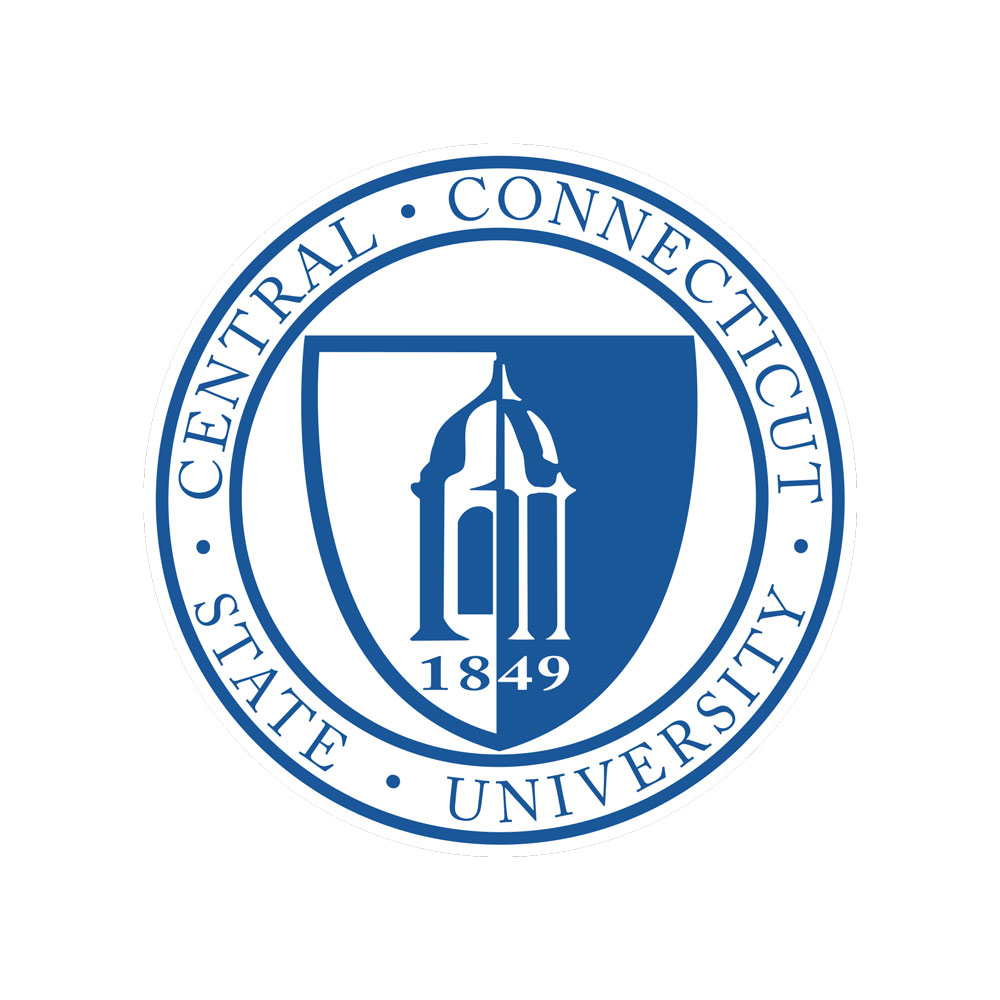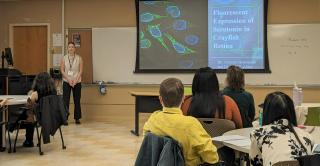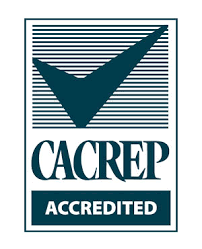
Time Required to Complete the MS in Counselor Education
Required Graduate Credit Hours:
- 60/63 (thesis project optional)
Full-Time Student:
- Three (3) years, which includes coursework taken outside the traditional fall and spring academic semesters (i.e., summer sessions)
Part-Time Student:
- Maximum of six (6) years
Catalog Entry
This is an unofficial description for this program. For official information check the Academic Catalog.
The Clinical Professional Counseling specialization prepares students to pursue employment in a variety of mental health and rehabilitation agencies. Students may choose a track in Clinical Mental Health Counseling, Clinical Rehabilitation Counseling, or Clinical Addictions Recovery Counseling. The Clinical Professional Counseling specialization provides the foundational coursework necessary for individuals interested in certification as Certified Rehabilitation Counselors (CRC) and/or meeting State of Connecticut Department of Public Health requirements for becoming a Licensed Professional Counselor (LPC) and Licensed Alcohol and Drug Counselors (LADC). There are additional post-master's training requirements for both LPC and LADC candidates. The Clinical Professional Counseling is dually accrediated in specializations of Clinical Mental Health Counseling and Clinical Rehabilitation Counseling by the Council on Accreditation of Counseling and Related Educational Programs (CACREP).
Program Learning Outcomes:
Students in the program will be expected to:
- Exhibit behaviors and attitudes appropriate to the clinical professional counseling profession;
- Demonstrate pertinent and professionally relevant knowledge in the eight professional counseling standards of the Council for Accreditation of Counseling and Related Educational Programs (CACREP) as well as the eight core areas established by the National Board of Certified Counselors (NBCC).
- Demonstrate professional behaviors and practice in professional and rehabilitation counseling settings;
- Demonstrate knowledge of current ethical and legal guidelines that influence one's behavior as a counselor; and
- Demonstrate core skills that provide the foundations to understand the professional and rehabilitation counseling process and become more aware of one's interpersonal interactions.
Admission Requirements for Clinical Professional Counseling
Applicants must hold a bachelor’s degree from a regionally accredited institution of higher education. Admissions to the School Counseling, Clinical Professional Counseling, and Student Development in Higher Education programs are made on a competitive basis only one time per year. All applications must be completed and received by February 1 for fall admission. Candidates for admission will be considered on the basis of the following criteria:
1) Grade point average: Minimum 2.70 grade point average (GPA) for all undergraduate courses and a 3.00 for all graduate courses, based on a 4.00 point scale where A is 4.00.
2) Three recommendations from individuals able to testify to the student’s suitability as a prospective counselor.
3) A 2–3 page typewritten (double spaced) essay describing the following:
a) Reasons for entering the counseling profession.
b) Personal and professional experiences that influenced you to pursue the counseling profession.
c) Personal characteristics you believe will contribute to your success as a counselor.
4) A personal interview by the program’s faculty admissions committee. The committee will assess the student’s personal attributes and life experiences that might contribute to the student’s potential for success as a professional counselor.
The admissions application, application fee, and official transcripts from each college/university (except CCSU) where any course has been taken must be sent directly to the Graduate Recruitment and Admissions Office.
Instructions for uploading the essay and for obtaining and submitting the recommendation letters will be found within the graduate online application.
Contact: 860-832-2154
Course and Capstone Requirements
Core
CNSL 500 The Dynamics of Group Behavior 3 Credits
CNSL 501 Theories and Techniques in Counseling 6 Credits
CNSL 503 Supervised Clinical Professional Counseling Practicum 3 Credits
CNSL 504 Professional Studies in Counseling 3 Credits
CNSL 505 Counseling and Human Development Across the Lifespan 3 Credits
or
PSY 512 Seminar in Developmental Psychology 3 Credits
CNSL 521 Career Counseling and Development 3 Credits
CNSL 522 Appraisal Procedures in Counseling 3 Credits
CNSL 568 CNSL 568 Foundations of Addictions Counseling 3 Credits
CNSL 569 Foundations of Clinical Mental Health Counseling 3 Credits
CNSL 594 Supervised Clinical Professional Counseling Internship 3 Credits
CNSL 594 (two semesters fall & spring for a total of 6 credits)
Students in the Clinical Mental Health Counseling track are required to take an additional 24 credits to equal 63 credits:
CNSL 525 Multicultural Counseling 3 Credits
CNSL 560 Introduction to Rehabilitation Counseling 3 Credits
CNSL 561 Advanced Rehabilitation Counseling 3 Credits
CNSL 563 Medical Aspects of Rehabilitation Counseling 3 Credits
CNSL 572 Assessment, Treatment and Recovery in Counseling 3 Credits
CNSL 571 Mindfulness-Based Mental Health Counseling 3 Credits
CNSL 573 Counseling Families 3 Credits
or
Comprehensive Exam
CNSL 599 Students take a Thesis (Plan A) 3 OR Comprehensive Exam (Plan B) 0.
Students in the Clinical Rehabilitation Counseling track are required to take an additional 21-24 credits to equal 60-63 credits.:
CNSL 525 Multicultural Counseling 3 Credits
CNSL 560 Introduction to Rehabilitation Counseling 3 Credits
CNSL 561 Advanced Rehabilitation Counseling 3 Credits
CNSL 563 Medical Aspects of Rehabilitation Counseling 3 Credits
CNSL 564 Rehabilitation and Disability Case Management Practices 3 Credits
or
CNSL 572 Assessment, Treatment and Recovery in Counseling 3 Credits
CNSL 571 Mindfulness-Based Mental Health Counseling 3 Credits
CNSL 573 Counseling Families 3 Credits
or
Comprehensive Exam
CNSL 599 Students take a Thesis (Plan A) 3 OR Comprehensive Exam (Plan B) 0.
Students in the Clinical Addictions Recovery Counseling track are required to take an additional 24 credits to equal 63 credits.:
CNSL 525 Multicultural Counseling 3 Credits
CNSL 560 Introduction to Rehabilitation Counseling 3 Credits
CNSL 561 Advanced Rehabilitation Counseling 3 Credits
CNSL 563 Medical Aspects of Rehabilitation Counseling 3 Credits
CNSL 571 Mindfulness-Based Mental Health Counseling 3 Credits
CNSL 572 Assessment, Treatment and Recovery in Counseling 3 Credits
CNSL 573 Counseling Families 3 Credits
or
Comprehensive Exam
CNSL 599 Students take a Thesis (Plan A) 3 OR Comprehensive Exam (Plan B) 0.
Students in the Gerontology Counseling track are required to take an additional 21 credits:
CNSL 525 Multicultural Counseling 3 Credits
CNSL 560 Introduction to Rehabilitation Counseling 3 Credits
CNSL 561 Advanced Rehabilitation Counseling 3 Credits
CNSL 563 Medical Aspects of Rehabilitation Counseling 3 Credits
CNSL 571 Mindfulness-Based Mental Health Counseling 3 Credits
Plan A: Thesis
Students in the Clinical Mental Health track or Clinical Additions Recovery Counseling electing to do a thesis (Plan A) will be exempt from one course as determined with the advisor.
Plan B: Comprehensive Examination
Students take the national examination: Counselor Preparation Competency Examination (CPCE)
Total Credit Hours: 60




